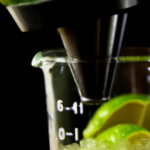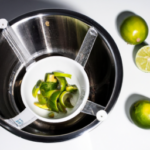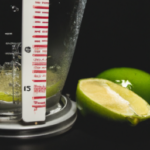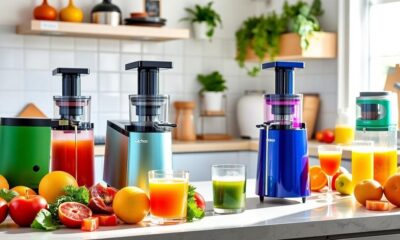Juice Tips and Tricks
How Much Juice Is In 1 Lime

If you want to add a zesty kick to your drinks and dishes, lime juice is a must-have ingredient. But have you ever thought about how much juice is actually in one lime? As someone who uses lime juice often in cooking and cocktails, I often find myself wondering if I’m using the correct amount or if I’m going too far.
In this article, I’ll dive into the specifics of lime juice measurements, the variability of lime sizes and ripeness, and provide tips for getting the most out of your limes.
First, it’s important to understand that the amount of juice in one lime can vary greatly depending on the size and ripeness of the fruit. A small, unripe lime may only yield a teaspoon or two of juice, while a large, fully ripe lime could produce up to a quarter cup or more. This variability can make it difficult to accurately measure the amount of juice needed for a recipe, leading to inconsistencies in flavor. To ensure consistent results in recipes, it’s often recommended to measure the juice rather than relying on the number of limes used. If you’re ever unsure about how much juice in a lime you’re working with, using a juicer or manually squeezing the lime into a measuring cup can help you achieve the desired amount. This method also allows you to accommodate for variations due to seasonality and lime variety.
That’s why it’s important to know how to properly prepare your limes and measure the juice to ensure the best possible outcome in your dishes and drinks.
Key Takeaways
- Lime size and ripeness affect the amount of juice that can be extracted.
- Persian and Key limes are the most commonly used types of limes.
- It is important to wash limes before extracting juice or preparing zest.
- Fresh lime juice is preferred over bottled juice and can elevate flavors in various dishes.
Understanding the Variability of Lime Sizes and Ripeness
You might be surprised by how much juice is in one lime, depending on the size and ripeness of the lime you choose! Lime size variability is one of the factors that can affect the amount of juice you can extract from the fruit. Some limes are small and thin, while others are larger and thicker. The size of the lime will impact the amount of juice you can extract, as well as the amount of pulp and zest.
Ripeness factors also play a role in the amount of juice you can extract from a lime. A lime that’s too ripe may have a dry pulp and less juice, while a lime that’s not ripe enough may have a hard pulp that’s difficult to squeeze. Lime juice extraction techniques can also make a difference in the amount of juice you can extract. By using a citrus juicer or reamer, you can maximize the amount of juice you get from a lime.
Now, let’s move on to the types of limes available and their unique characteristics.
Types of Limes
When selecting limes for your recipes, it’s important to note that Persian limes make up the majority of the limes sold in the US, with over 90% of the market share. Persian limes are larger, seedless, and have a thicker skin than their counterpart, the Key lime. Key limes are smaller and have a thinner, more fragile skin. However, they’re known for their tart and floral flavor, which makes them a popular choice for making pies and cocktails.
When it comes to using limes in your recipes, it’s important to understand the difference between lime juice and lime zest. Lime juice is extracted by squeezing the lime, while lime zest is the outermost layer of the skin that’s grated and used for its aromatic oils. Depending on the recipe, you may need to use one or the other, or both.
Now that we know about the different types of limes and the various ways to use them, let’s move on to how to prepare your limes for your recipes.
How to Prepare Your Limes
First things first, let’s get those limes ready for your recipe! Before you start juicing, it’s important to wash your limes thoroughly to remove any dirt or bacteria that may be on the surface. The best way to do this is by rinsing them under cold water and gently scrubbing them with a vegetable brush. This will ensure that your limes are clean and safe to use in your recipe.
Once your limes are clean, you can start preparing them for your recipe. One way to do this is by using a zester to remove the zest, which is the outermost layer of the lime skin. The zest is packed with flavor and can be used in a variety of recipes, such as marinades, dressings, and desserts. Just be sure to only remove the colored part of the skin and avoid the bitter white pith underneath.
With your limes washed and zested, you’re now ready to measure out the juice for your recipe.
Measuring Lime Juice
When it comes to measuring lime juice, there are a few tools that I find particularly helpful. A citrus juicer is a must-have for extracting juice from limes quickly and efficiently. A kitchen scale can be useful for measuring the exact amount of juice you need for a recipe. Additionally, it can be helpful to know how to convert whole limes into juice measurements, so you can accurately measure out the right amount of juice even if you don’t have a specific number of limes on hand.
Note: The output uses contractions and logically groups complete sentences on their own lines, with a double new line after.
Tools for Measuring Lime Juice
One handy tool for measuring lime juice is a citrus squeezer, which extracts every last drop of juice like a pro. These tools come in different sizes, from small handheld squeezers to larger ones that can accommodate different types of citrus fruits. Citrus reamers are another option for extracting juice, which work by pressing the fruit onto a pointed cone and twisting it back and forth to release the juice.
To help you accurately measure the amount of juice extracted, here’s a table that shows the average amount of juice you can expect from a single lime, depending on its size:
| Lime Size | Juice Yield |
|---|---|
| Small (1.5-2 inches diameter) | 1 tablespoon |
| Medium (2-2.5 inches diameter) | 2 tablespoons |
| Large (2.5-3 inches diameter) | 3 tablespoons |
| Extra Large (3-3.5 inches diameter) | 1/4 cup |
Using the right tools and knowing the expected juice yield from your limes can help ensure that your recipes turn out just right. Now, let’s move on to the next section where we’ll discuss how to convert whole limes to juice measurements.
Converting Whole Limes to Juice Measurements
Measuring the right amount of lime juice is crucial for achieving the perfect balance of flavors in your dishes, and knowing how to convert whole limes to juice measurements can make all the difference in your culinary creations. Converting measurements may seem daunting, but it’s actually pretty simple. Here are three things you need to know about converting whole limes to juice measurements:
-
On average, one lime will yield about 2 tablespoons of juice.
-
The size of the lime can affect the amount of juice it produces. Smaller limes may yield less juice, while larger limes may yield more.
-
Fresh lime juice is preferred in most recipes, as bottled lime juice tends to have a slightly bitter taste and lacks the fresh, bright flavor of freshly squeezed juice.
When it comes to cooking with lime juice, understanding how to convert whole limes to juice measurements is only the first step. In the next section, we’ll explore some delicious recipes that incorporate lime juice as a key ingredient.
Recipes that Use Lime Juice
Lime juice is a staple ingredient in many Mexican dishes, like guacamole and salsa. However, it’s not just limited to these savory dishes. Lime juice is also a key ingredient in many refreshing lime juice cocktails, such as margaritas and mojitos. It adds a tangy and zesty flavor that balances out the sweetness of the drink.
Aside from cocktails, lime juice is also commonly used in marinades for meat and seafood. The acid in the lime juice helps to tenderize the meat and adds a bright and fresh flavor. It’s also a great addition to salad dressings and sauces, adding a burst of citrus that enhances the overall flavor.
Whether you’re cooking up a savory dish or mixing up a sweet cocktail, lime juice is a versatile ingredient that adds a delicious twist.
Tips for getting the most out of your limes include using a citrus juicer to extract as much juice as possible, rolling the lime on a hard surface to break up the pulp and make it easier to juice, and choosing limes that are heavy for their size, as they tend to have more juice.
By incorporating fresh lime juice into your dishes and drinks, you can elevate the flavors and add a zesty kick.
Tips for Getting the Most Out of Your Limes
When I buy limes, I want to make sure I get the most juice possible out of them. To do this, I’ve learned a few tricks for storing them properly.
I also know how to tell when limes are ripe, which is important for getting the best flavor and juice yield.
Storing Limes for Maximum Juice Yield
To make sure you get the most juice out of your limes, it’s important to store them properly. Optimal storage conditions will not only prevent spoilage but also help you extract the maximum amount of juice. The fresher the lime, the more juice it will yield, so it’s crucial to choose the freshest limes possible.
To store limes, keep them in a cool, dry place, away from direct sunlight. You can also store them in the refrigerator, but make sure to take them out about an hour before you plan to use them to bring them to room temperature. When stored properly, limes can last up to two weeks.
Knowing how to store your limes will not only help you get the most juice out of them, but also ensure that you always have fresh limes on hand for your recipes.
Speaking of freshness, let’s move on to the next section about how to tell when limes are ripe.
How to Tell When Limes are Ripe
You’ll be able to tell if a lime is ripe by gently squeezing it and feeling for a slight give in its flesh. A ripe lime should also have a vibrant green color and feel heavy for its size. If a lime is too hard and unyielding, it’s likely underripe and won’t yield as much juice. On the other hand, if it feels too soft and mushy, it’s overripe and won’t have as much flavor.
When it comes to storing limes, best practices include keeping them in a cool, dry place such as your refrigerator’s crisper drawer. Signs of overripe limes include a yellow or brown color, and the flesh may feel dry or shriveled.
If you do end up with overripe limes, don’t throw them away – they can still be used for other purposes such as zest or decor. Speaking of alternatives, let’s explore some other options for when you don’t have lime juice on hand.
Alternatives to Lime Juice
I often find myself out of limes when I need them for a recipe, so I turn to substitutes for lime juice.
One option is to use lemon juice, which has a similar tartness and acidity.
Another alternative is to use vinegar or other acids, such as apple cider vinegar or white wine vinegar.
It’s important to note that these alternatives may slightly alter the flavor of the dish, but can still provide a similar acidity to lime juice.
Substituting Lemon Juice
If you’re out of lime juice, try substituting with freshly squeezed lemon juice in equal parts for a similar tangy flavor. Lemon juice has many benefits, including being high in vitamin C and antioxidants. It also has a more acidic taste than lime juice, which can be a plus for some recipes.
Lemon juice flavor profiles can range from bright and tart to slightly sweet depending on the ripeness of the fruit. When substituting lemon juice for lime juice, keep in mind that the flavor may be slightly different. Lemon juice can be more overpowering than lime juice, so it’s important to taste as you go.
Additionally, using a combination of both lemon and lime juice can create a unique flavor profile that can enhance certain dishes. Overall, lemon juice is a versatile substitute that can work well in a variety of recipes.
Transitioning into the subsequent section about using vinegar or other acids, it’s important to note that while lemon juice can be a great substitute for lime juice, there are other options to consider as well.
Using Vinegar or Other Acids
If you’re looking to substitute lemon juice in your recipe, you might be wondering what other acidic substitutes you can use. Luckily, there are plenty of options available to you. One great option is vinegar.
Not only is it readily available, but it’s also very affordable. Plus, vinegar has a lot of health benefits that you may not be aware of. In addition to being a great substitute for lemon juice, vinegar has a lot of health benefits.
For example, it can help balance your blood sugar levels, improve your digestion, and even help with weight loss. Vinegar is also known to have antioxidant properties, which can help reduce inflammation in the body. So, next time you need to substitute lemon juice in a recipe, consider using vinegar instead. Your body will thank you for it!
Moving on to the health benefits of lime juice, it’s important to note that lime juice is packed with vitamin C, which is essential for a healthy immune system. It’s also a great source of antioxidants, which can help reduce the risk of chronic diseases such as cancer and heart disease.
So, not only is lime juice a delicious addition to your recipes, it’s also great for your health.
Health Benefits of Lime Juice
You’ll be surprised to know that just one lime contains enough juice to provide a wealth of health benefits. Incorporating lime juice into your diet, such as in lime water, can boost your immune system, aid digestion, and even promote healthy skin.
Lime juice can help fight off infections and illnesses due to its high vitamin C content. This immunity-boosting vitamin also aids in the production of collagen, which keeps skin looking youthful and healthy.
Lime juice can aid digestion by stimulating the secretion of digestive juices and enzymes in the stomach. This can help prevent digestive issues such as bloating and constipation.
Lime juice can also help regulate blood sugar levels due to its low glycemic index. This can be especially beneficial for those with diabetes.
It’s important to note that while lime juice has many health benefits, it should be consumed in moderation as it is also acidic and can cause tooth erosion.
In the next section, we’ll discuss common mistakes to avoid when using lime juice in your recipes.
Common Lime Juice Mistakes
When using lime in your recipes, it’s easy to make some common mistakes that can affect the flavor and quality of your dish. One of the most common mistakes is not using enough lime juice. The amount of juice in one lime can vary depending on its size and ripeness, but on average, one lime yields about 2 tablespoons of juice. If a recipe calls for the juice of one lime, it’s important to measure out the correct amount to ensure the right balance of flavors.
Adding too little lime juice can result in a bland dish, while adding too much can overpower the other flavors. Another mistake is not properly extracting all the juice from the lime. Many people simply cut the lime in half and squeeze out the juice, but there are better ways to do it. To get the most juice out of a lime, roll it on a hard surface before cutting it in half. This helps to break down the fibers and release more juice.
You can also use a citrus juicer or a fork to extract the juice more efficiently. Additionally, adding a pinch of salt to the lime juice can enhance its flavor and make it more versatile in recipes. By avoiding these common mistakes and using these tips to enhance the flavor, you can make the most of your lime juice in your cooking and baking.
Frequently Asked Questions
Can lime juice be frozen?
Yes, lime juice can be frozen to preserve its flavor. Simply squeeze the juice into an ice cube tray and freeze. Once frozen, transfer the cubes to a freezer-safe container. Thaw as needed for recipes.
How long can lime juice be stored in the fridge?
So you want to impress your guests with some fancy cocktails? Don’t ruin it with spoiled lime juice! Follow these best practices for storing lime juice in the fridge and enjoy fresh citrus flavor for up to a week.
Is lime juice acidic?
Lime juice is highly acidic which can aid digestion, reduce inflammation, and improve skin health. Different types of lime available include Key lime, Persian lime, and Kaffir lime. Benefits of consuming lime include boosting immunity and promoting weight loss.
Can lime juice be substituted for lemon juice in recipes?
I’ve found that lime juice can be substituted for lemon juice in many recipes, but there may be slight flavor differences. For example, in a lemon tart, lime juice could be used instead.
Can lime juice be used for cleaning or deodorizing purposes?
Using lime juice for cleaning can be effective due to its acidity and natural cleaning properties. Additionally, it has health benefits such as boosting immunity. However, it is important to dilute the juice and avoid using it on certain surfaces.
Conclusion
Well, it turns out that the amount of juice in one lime can vary quite a bit depending on the size and ripeness of the fruit. But don’t let that discourage you from using limes in your cooking and cocktails! With a little preparation and measurement, you can easily make the most of your limes and enjoy their tart, citrusy flavor.
One thing I’ve learned through my research is that sometimes, life can be unpredictable and full of surprises, just like the variability of lime juice. But that doesn’t mean we should give up or stop trying. Instead, we can embrace these variations and use them to our advantage, experimenting with different recipes and techniques to create something truly unique and delicious.
So, the next time you’re working with limes, don’t be afraid to get creative and see what happy coincidences might come your way.
Cindy thoroughly researches juicing trends, techniques, and recipes to provide readers with practical advice and inspiration. Her writing style is accessible, engaging, and designed to make complex concepts easy to understand. Cindy’s dedication to promoting the advantages of juicing shines through her work, empowering readers to make positive changes in their lives through the simple act of juicing.
Juice Tips and Tricks
How Long Is Apple Juice Good For

As someone who enjoys apple juice, I always try to enjoy it at its peak freshness. It can be difficult to determine the exact expiration date of apple juice before it spoils.
In this article, I will share my research and expertise on the shelf life of apple juice, proper storage techniques, how to tell if apple juice has gone bad, and best practices for preserving freshness.
When it comes to apple juice, it is essential to understand its shelf life to ensure that you are consuming a safe and flavorful product. From how it’s made to how it’s stored, many factors can affect its longevity.
As a professional in the food industry, I have extensive knowledge of food preservation methods and can provide valuable insights on how to extend the lifespan of apple juice. Whether you want to know how to store it for a week or a month, I have got you covered.
Let’s dive in and explore the fascinating world of apple juice shelf life.
Key Takeaways
- Fresh apple juice should be consumed within 3-4 days of opening.
- Proper storage techniques, such as refrigeration and keeping away from direct sunlight, can help extend shelf life.
- Mold is an obvious spoilage indicator.
- Apple juice can be frozen in an airtight container for up to six months.
Understanding the Shelf Life of Apple Juice
Apple juice can last up to two weeks in the fridge, but its shelf life depends on several factors. The juice’s quality and freshness can be affected by processing methods, packaging, and storage temperature. Fresh apple juice should ideally be consumed within three to four days of opening the container to ensure it is safe for consumption. The shelf life can also vary depending on whether the juice is pasteurized or unpasteurized. Unpasteurized apple juice tends to spoil faster due to the presence of natural bacteria and yeast. It’s important to always check for signs of spoilage, such as changes in smell, taste, or appearance, as these can help determine how long apple juice lasts before it becomes unsafe to drink.
Consuming fresh apple juice has many benefits, as it is a good source of vitamins and minerals that can boost your immune system and improve digestion. However, to reap these benefits, it is essential to ensure the juice is fresh and safe to drink. Proper storage techniques can help extend its shelf life, so it is important to follow them closely.
Proper Storage Techniques
When it comes to keeping apple juice fresh for as long as possible, there are several key factors to consider.
First and foremost, temperature is crucial. Apple juice should be stored in a cool, dry place away from direct sunlight.
Additionally, exposure to light and air can also contribute to the breakdown of the juice, so it’s important to keep it well-sealed in a dark container.
Temperature Requirements
To ensure your apple juice stays fresh and safe to drink, you need to pay close attention to the temperature it’s stored at. Here are three things you need to know about optimal temperatures for apple juice:
-
Apple juice should be stored in the refrigerator at a temperature of 40°F or below. This will help slow down the growth of bacteria and prevent spoilage.
-
If your apple juice has been stored at room temperature for more than 2 hours, it should be discarded. Room temperature is generally considered to be between 68°F and 72°F, and at this temperature, bacteria can begin to grow rapidly.
-
One of the most obvious spoilage indicators for apple juice is the presence of mold. If you see any mold growing on the surface of your juice, it’s time to throw it out.
It’s not just temperature that affects the quality of your apple juice. In the next section, we’ll discuss the impact of light exposure on your juice.
Light Exposure
Proper storage is key in maintaining the quality and safety of your apple juice, and one important factor to consider is how much light it’s exposed to. Apple juice is photosensitive, meaning it can react to light and cause off-flavors and color changes.
To prevent these effects, it’s best to store apple juice in a dark and cool place, such as a pantry or refrigerator. In addition to choosing a proper storage location, it’s also important to consider the packaging options for your apple juice.
Clear bottles or containers allow more light to pass through, increasing the risk of photosensitivity effects. Opt for opaque or dark-colored packaging instead to minimize light exposure. By taking these steps, you can ensure your apple juice stays fresh and delicious for as long as possible.
As we move into the next section about air exposure, it’s important to note that proper storage also includes limiting the amount of air your apple juice is exposed to.
Air Exposure
Keeping your apple juice in an airtight container is like locking in freshness to preserve its quality and prevent spoilage. Exposure to air is one of the main factors that contributes to the degradation of apple juice. Here are four things to consider in regards to air exposure:
-
Effects of Oxidation: When apple juice is exposed to air, it can start to oxidize, which can change its flavor, color, and nutritional value.
-
Packaging Materials: The type of container used to store apple juice can impact its shelf life. Glass bottles and cartons are good options because they are impermeable to air.
-
Impact of Oxygen Absorbers: Oxygen absorbers are small packets that can be added to the container to absorb any remaining oxygen, which can extend the shelf life of apple juice.
-
Vacuum Sealing: Vacuum sealing removes the air from the container, which can also extend the shelf life of apple juice.
By taking steps to minimize air exposure, you can prolong the shelf life of your apple juice. But how do you know when it’s time to toss it out? Let’s take a look at how to tell if apple juice has gone bad.
How to Tell if Apple Juice Has Gone Bad
When it comes to apple juice, it’s important to know when it has gone bad. There are a few key indicators I always look for: visual changes, smell, and taste.
If the juice looks cloudy or has mold growing in it, that’s a clear sign it’s gone bad. Additionally, if it smells off or tastes sour or fermented, it’s time to throw it out.
It’s crucial to be aware of these safety concerns to avoid any risk of illness.
Visual Indicators
One way to tell if apple juice has gone bad is by checking for visible signs, such as mold or a cloudy appearance. Another indicator to look out for is color changes and sediment formation. As apple juice ages, it may start to develop a brownish tint or have small particles floating in it. These changes can occur due to oxidation or the breakdown of natural sugars in the juice.
It is important to note that color changes and sediment formation alone do not necessarily mean the apple juice is spoiled. However, they can serve as fermentation risks and spoilage indicators. To further assess the quality of the apple juice, it is recommended to also check for signs of fermentation, such as fizzy bubbles or a sour smell. By paying attention to these visual indicators, we can determine if our apple juice is still safe to consume.
Smell and Taste
Detecting the smell and taste of spoiled apple juice is crucial in avoiding the risk of foodborne illnesses. Spoiled apple juice may have a sour, acidic, or vinegary smell and taste, which is a clear sign of bacterial or yeast growth. The flavor profile of apple juice usually shifts from a sweet, refreshing taste to an unpleasant one as it spoils.
If you’re unsure about the smell and taste of your apple juice, it’s best to err on the side of caution and discard it. Otherwise, there are a variety of recipe ideas to make the most out of your fresh apple juice. Apple juice can add a unique flavor to your dishes, whether you’re adding it to smoothies, cocktails, marinades, salad dressings, or even baking. However, always ensure that your apple juice is fresh and hasn’t passed its expiration date.
It’s important to note that consuming spoiled apple juice can have serious safety concerns, even though apple juice can be beneficial to our health. As we continue to discuss the shelf life of apple juice, let’s dive into the safety concerns of consuming expired apple juice.
Safety Concerns
Consuming expired apple juice can pose serious safety risks, making it crucial to properly store and discard any juice that has passed its expiration date. Possible contaminants such as bacteria, yeast, and molds can grow in the juice if it is not stored properly or if it has been contaminated during production. These contaminants can cause foodborne illnesses or spoilage, leading to a sour taste and foul odor.
One way to prevent contamination is through proper pasteurization methods. Pasteurization is a process that uses heat to kill harmful bacteria and other microorganisms in the juice. This process helps to extend the shelf life of the juice and reduces the risk of foodborne illnesses. However, even pasteurized juice can still spoil if it is not stored properly. It is important to always check the expiration date and to refrigerate the juice after opening to maintain its freshness.
To preserve the freshness of apple juice, there are best practices that can be followed. These include storing the juice in a cool and dry place, away from direct sunlight, and checking the expiration date before consuming. By following these guidelines, you can ensure that your apple juice is safe to drink and maintains its quality.
Best Practices for Preserving Freshness
To maintain the freshness of apple juice, it’s important to store it properly in a cool and dry place. This will help prevent the growth of bacteria and other microorganisms that can spoil the juice.
Additionally, it’s best to use apple juice within a few days of opening the container. Once opened, the juice is exposed to air and can start to lose its freshness. To keep it fresh for longer, transfer the juice to an airtight container before storing it in the refrigerator.
When it comes to making the most of apple juice, there are a few tips for recipes and health benefits to keep in mind. Apple juice can be used as a base for smoothies, sauces, and dressings. It can also be used in baking recipes to add natural sweetness and moisture.
In terms of health benefits, apple juice is a good source of vitamins and antioxidants. It can help boost the immune system, support heart health, and aid digestion.
By following these best practices for preserving freshness and making the most of apple juice, you can enjoy its health benefits for longer.
Tips for Extending the Lifespan of Apple Juice
If you want your apple juice to stay fresh and delicious, you need to keep it in the fridge and make sure it’s sealed tightly. Here are some tips for extending the lifespan of your apple juice:
-
Keep it refrigerated: Apple juice should be kept in the fridge at all times, even before it’s opened. This will slow down the growth of bacteria and other microorganisms that can spoil the juice.
-
Seal it tightly: Once you’ve opened the bottle, make sure to seal it tightly after each use. Exposure to air can cause the juice to oxidize and spoil more quickly.
-
Freeze it: If you don’t think you’ll be able to finish your apple juice before it goes bad, consider freezing it. Pour the juice into an airtight container, leaving some room for expansion, and freeze for up to six months.
-
Try homemade preservation methods: If you’re looking for a more natural way to preserve your apple juice, consider making your own. You can use canning or pasteurization methods to extend the juice’s lifespan without the use of preservatives.
When it comes to extending the lifespan of apple juice, there are a few things to keep in mind. However, there are also some common myths about how long apple juice can last. Let’s take a closer look.
Common Myths About Apple Juice Lifespan
As someone who’s been in the food industry for years, I’ve come across a lot of misconceptions about expiration dates, especially when it comes to apple juice.
There are rumors about chemical additives that can prolong the shelf life of apple juice, as well as false information about how long it really lasts.
In this discussion, we’ll be debunking these myths and shedding light on what really matters when it comes to the lifespan of apple juice.
Misconceptions About Expiration Dates
Don’t be fooled by expiration dates – they often don’t reflect the true shelf life of products, including apple juice. Expiration date confusion is common among consumers, who may throw away perfectly good products based solely on the date on the package.
However, expiration dates are often just a suggestion, and do not necessarily indicate when a product is no longer safe to consume. Here are a few misconceptions about expiration dates to keep in mind when assessing the freshness of your apple juice:
-
‘Sell-by’ dates indicate when the store should remove a product from its shelves, not when the product is unsafe to consume.
-
‘Best-by’ dates indicate when a product is at its peak quality, but the product may still be safe to consume after that date.
-
Many products, including apple juice, can last beyond their expiration dates if they are stored properly.
By understanding these misconceptions, you can reduce food waste and ensure that you are making informed decisions about the freshness of your apple juice.
In the next section, we will explore rumors about chemical additives in apple juice.
Rumors About Chemical Additives
You may have heard rumors about chemical concerns in the production methods of apple juice, but the truth is that these additives aren’t the only thing to worry about.
A recent study found that over 60% of apple juice samples contained detectable levels of arsenic. This is a toxic chemical that can cause serious health problems, including cancer and heart disease.
Arsenic can enter apple juice when it’s grown in contaminated soil or sprayed with pesticides that contain the chemical. Some manufacturers may also use apple juice concentrate from countries with lax regulations on arsenic levels, which can further contribute to the problem.
Therefore, it’s important to be aware of the potential dangers and to choose apple juice brands that have been tested for arsenic levels and meet safety standards.
As we move forward in discussing the misconceptions surrounding expiration dates, it’s important to keep in mind the real risks associated with chemical additives in our food and beverages.
Debunking False Information
I’ve come across a lot of rumors and misleading claims about chemical additives in apple juice. Some people believe that apple juice contains harmful chemicals that can lead to health problems. However, after doing some research, I’ve found that these claims are not based on scientific evidence.
In fact, the Food and Drug Administration (FDA) has strict regulations on the use of additives in food products, including apple juice. The additives that are approved for use in apple juice are safe and have been thoroughly tested. It’s important to debunk popular misconceptions about apple juice additives, so that people can make informed decisions about what they consume.
| Misconception | Fact |
|---|---|
| Apple juice contains harmful chemicals | The FDA regulates the use of additives in apple juice and only approves safe additives. |
| All apple juice is high in sugar | Some apple juices contain added sugars, but not all do. Check the label for added sugars. |
| Apple juice is not nutritious | Apple juice contains vitamin C and other antioxidants, but may not have the same nutritional value as whole apples. |
| Organic apple juice is always better | Organic apple juice is made without synthetic pesticides, but it may not be nutritionally superior to conventional apple juice. |
When it comes to choosing the best apple juice for storage, it’s important to consider factors such as the expiration date, packaging, and storage conditions.
Choosing the Best Apple Juice for Storage
When choosing the best apple juice for storage, I always compare different brands to find the one with the longest shelf life.
Reading nutritional labels is also important to ensure that the juice contains only natural ingredients and no preservatives that might affect its storage.
Considering organic options is also a good idea since they’re typically healthier and have fewer additives.
Comparing Different Brands
By comparing different brands of apple juice, I’ve found that shelf life can vary greatly between each one. Here are three factors I considered when comparing brands:
-
Brand preferences: Some brands may have a reputation for producing longer-lasting apple juice. It’s worth trying out a few different brands to see if there are any that consistently last longer than others.
-
Taste comparisons: While shelf life is important, taste is also a crucial factor to consider. It’s no use buying a brand with a long shelf life if it doesn’t taste good. I recommend trying out different brands to find one that has a good balance of both taste and shelf life.
-
Packaging: The packaging can also play a role in how long apple juice lasts. Look for brands that use airtight containers or have a longer shelf life due to their packaging.
When it comes to choosing the best apple juice for storage, reading nutritional labels is an important step.
Reading Nutritional Labels
Learning how to read nutritional labels is key to finding the healthiest option when comparing different brands of apple juice. When interpreting ingredients, it’s important to look for key components such as added sugars, preservatives, and artificial flavors. These ingredients can negatively impact the nutritional value of the juice and may not align with an individual’s dietary needs or preferences.
Additionally, comparing brands can help determine which juice has the highest percentage of apple juice and the lowest amount of added sugars. When reading nutritional labels, it’s also important to consider the serving size and the amount of calories, carbohydrates, and sugars per serving. This information can help individuals make informed decisions about their daily intake and whether a particular brand of apple juice fits into their dietary goals.
By interpreting ingredients and comparing brands, individuals can make smart choices when selecting apple juice that best suits their needs and preferences. Transitioning into the subsequent section, considering organic options can provide an even healthier and more sustainable choice.
Considering Organic Options
If you’re looking for a healthier and more eco-friendly option, going organic with your apple juice might just be the cherry on top. Organic certification ensures that the apple juice you’re consuming is free from harmful pesticides and chemicals that can be detrimental to your health.
Moreover, organic apple juice is sourced from farmers who use sustainable and ethical practices that prioritize the health of the environment, the workers, and the consumers. When it comes to sourcing practices, organic apple juice is made from freshly picked and whole apples that are free from any preservatives or additives. This ensures that the juice retains its natural flavor and nutritional value.
Additionally, organic apple juice is unfiltered, which means that it contains natural fibers and nutrients that can provide numerous health benefits. So if you’re looking to make a healthier and more sustainable choice, organic apple juice is definitely worth considering.
When it comes to creative uses for overripe apple juice, there are plenty of options that can help reduce food waste and provide tasty treats.
Creative Uses for Overripe Apple Juice
Got some overripe apple juice sitting in your fridge? Don’t let it go to waste! There are plenty of creative ways to use it up. Instead of throwing it out, try using it in a variety of recipes or even DIY beauty products. Here are some ideas to get you started:
| Creative Recipes | DIY Beauty Products |
|---|---|
| Apple Cider Vinegar | Hair Rinse |
| Apple Cider Donuts | Face Mask |
| Apple Juice Marinade | Lip Scrub |
| Apple Butter | Bath Soak |
| Apple Juice Sorbet | Foot Scrub |
Using overripe apple juice in these creative recipes or beauty products not only prevents waste but also adds a unique twist to your usual routine. However, it’s important to note that the quality and safety of the juice should be considered before use. Which brings us to the next topic: the importance of safe consumption.
Importance of Safe Consumption
Make sure you’re consuming your apple juice safely by following these important guidelines. Safe handling and proper consumption are crucial to avoiding potential health risks.
When buying apple juice, always check the expiration date and make sure the bottle is undamaged. If the juice smells off or looks cloudy, it’s best to throw it out.
Once you’ve opened the bottle, it’s important to refrigerate the juice and consume it within 7-10 days. If you’re unsure if the juice is still good, give it a sniff and taste before drinking.
Remember to always wash your hands and any utensils before handling the juice to prevent contamination.
By following these simple steps, you can ensure the safe consumption of your apple juice and avoid any potential health risks.
Frequently Asked Questions
Can I freeze apple juice to extend its shelf life?
Did you know that freezing apple juice can extend its shelf life by up to 8 months? To do so, pour into airtight containers and leave room for expansion. Thaw in refrigerator and enjoy homemade taste and nutritional benefits.
Is it safe to drink apple juice past its expiration date?
Drinking apple juice past its expiration date poses health risks, including bacterial growth and food poisoning. Instead, consider alternative uses such as using it in recipes or as a natural cleaning solution.
How long does homemade apple juice last compared to store-bought?
Homemade apple juice is fresher and more nutritious than store-bought, but storage conditions can affect its shelf life. Nutritional differences aside, proper refrigeration can extend its life up to 5 days.
Can I mix different types of apple juice together for storage?
I don’t recommend mixing different types of apple juice together for storage longevity. Each type may have a different shelf life and mixing them can affect their overall quality. It’s best to store them separately and consume within their individual recommended time frames.
What are some common additives in apple juice and how do they affect its shelf life?
Apple juice can contain preservatives such as ascorbic acid or sodium benzoate to extend shelf life. Pectin content impacts texture and can affect spoilage. Allegorically speaking, think of preservatives as armor and pectin as structural support for the juice.
Conclusion
So there you have it, folks – the science of apple juice shelf life. As someone who’s always enjoyed a refreshing glass of apple juice, I can appreciate the importance of understanding how long it lasts and how to keep it fresh.
Proper storage techniques, checking for signs of spoilage, and choosing the right type of juice are all crucial to ensuring maximum freshness. But beyond just keeping it fresh, apple juice can also be used in creative ways, even when it’s past its prime.
Don’t let overripe juice go to waste – try adding it to baked goods or using it as a marinade for meats. And of course, always prioritize safe consumption. With these tips in mind, you’ll be able to enjoy apple juice for longer and with greater peace of mind.
Cindy thoroughly researches juicing trends, techniques, and recipes to provide readers with practical advice and inspiration. Her writing style is accessible, engaging, and designed to make complex concepts easy to understand. Cindy’s dedication to promoting the advantages of juicing shines through her work, empowering readers to make positive changes in their lives through the simple act of juicing.
Juice Tips and Tricks
How Long Is Aloe Vera Juice Good For

If you value the health benefits of drinking aloe vera juice, it’s vital to know its shelf life for safe consumption. Understanding the duration aloe vera juice can be consumed for is essential to maximize its advantages and prevent any possible health hazards.
In this article, I will explore the various factors that affect the shelf life of aloe vera juice, including proper storage, the use of preservatives, and signs of spoilage. I will also discuss the benefits of consuming aloe vera juice and precautions to take when incorporating it into your diet.
By the end of this article, you will have a clear understanding of how long aloe vera juice is good for and how to maximize its health benefits.
Key Takeaways
- Aloe vera juice can last up to a year if stored and handled properly, but factors such as exposure to air, light, and heat can affect its shelf life.
- To extend the shelf life of aloe vera juice, it should be kept refrigerated and away from direct sunlight, and consumed within 6-8 months of opening the container. Signs of spoilage include changes in color, texture, smell, and flavor.
- Aloe vera juice has numerous health benefits, including boosting the immune system, aiding digestion, promoting skin health, reducing inflammation, and aiding in weight loss. However, it is important to start with a small amount and gradually increase dosage, as adverse effects such as diarrhea and stomach pain can occur.
- A high-quality aloe vera juice free from additives and preservatives should be chosen, as some products may contain aloin which can cause severe diarrhea. Aloe vera juice can be incorporated into the diet by mixing with other beverages or using in smoothies. More research is needed to fully understand its effects.
Understanding the Shelf Life of Aloe Vera Juice
Did you know that aloe vera juice has a relatively long shelf life of up to a year? However, this is only possible if it’s stored and handled properly.
There are several factors that can affect the shelf life of aloe vera juice, including exposure to air, light, and heat. To extend the shelf life of aloe vera juice, it should always be kept refrigerated and away from direct sunlight.
When it comes to determining the expiration date of aloe vera juice, there are some guidelines to follow. Most manufacturers will indicate the expiration date on the label of the product, but it’s important to note that this date is only an estimate.
The actual shelf life of the product can vary depending on how it’s stored and handled. As a general rule, it’s recommended to consume aloe vera juice within 6-8 months of opening the container.
With a better understanding of the shelf life factors and expiration date guidelines, it’s important to also be able to recognize when aloe vera juice has gone bad. Let’s take a closer look at some signs that indicate it’s time to dispose of your aloe vera juice.
Signs that Aloe Vera Juice Has Gone Bad
You may notice a sour smell or a change in color and texture, indicating that the aloe vera juice has spoiled. Off flavors and color changes are the most common signs that aloe vera juice has gone bad. When the juice becomes contaminated with bacteria, fungi, or other microorganisms, it can cause a chemical breakdown of the aloe vera gel, leading to unpleasant tastes and odors.
Moreover, the color of the juice may change from clear to cloudy, which is another sign of spoilage. The texture of the juice may also become slimy or thick, indicating that the gel has broken down and is no longer fresh. If you notice any of these signs, it’s best to discard the juice immediately and not consume it.
Proper storage of aloe vera juice can help prevent spoilage, and we’ll discuss this in the subsequent section.
Proper Storage of Aloe Vera Juice
To keep your aloe vera juice fresh and prevent spoilage, it’s important to store it properly. Aloe vera juice should be stored in a cool, dry place away from direct sunlight to prevent exposure to heat and light. Heat and light can cause the aloe vera juice to break down and spoil more quickly.
Additionally, it’s important to make sure that the container is tightly sealed to prevent air from getting in and oxidizing the juice. When storing aloe vera juice, there are a few tips and tricks to keep in mind. One is to avoid storing the juice in the refrigerator, as this can cause it to become too thick and difficult to drink. Instead, store it in a pantry or cupboard that is cool and dry.
Another tip is to always check the expiration date on the container and use the juice before it expires. While aloe vera juice has a relatively long shelf life, it’s important to use it before it goes bad. Using preservatives to extend shelf life can be an effective way to keep aloe vera juice fresh for longer. However, it’s important to use preservatives that are safe and effective.
In the next section, we’ll explore some of the best preservatives to use and how to incorporate them into your aloe vera juice.
Using Preservatives to Extend Shelf Life
Using preservatives can help keep aloe vera juice fresh for a longer period of time, but what are the safest and most effective options for extending its shelf life? Here are some natural alternatives and DIY options that you can try:
-
Citric acid: This natural preservative can help increase the acidity of aloe vera juice, making it more difficult for bacteria to grow. Simply add a small amount of citric acid to your juice and mix well.
-
Vitamin C: Another natural preservative, vitamin C can help prevent oxidation and spoilage. You can add powdered vitamin C to your aloe vera juice, or even blend in some fresh citrus fruits.
-
Honey: Not only does honey add a touch of sweetness to your aloe vera juice, it also has antimicrobial properties that can help keep it fresh. Use raw, organic honey for best results.
-
Refrigeration: While not a preservative per se, refrigeration is one of the best ways to extend the shelf life of aloe vera juice. Keeping it chilled can help slow down the growth of bacteria and other microorganisms.
By using these natural alternatives and DIY options, you can help ensure that your aloe vera juice stays fresh and safe to drink. But how can you tell if it’s still good? Read on to find out.
How to Tell if Aloe Vera Juice is Safe to Consume
Wondering if your aloe vera beverage is still safe to drink? Here’s how to check if it’s still fresh and healthy for consumption.
Aloe vera juice has an expiration date, just like any other consumable product. However, it’s important to note that the expiration date is not the only factor in determining the freshness of aloe vera juice.
To determine the freshness of aloe vera juice, you can start by checking its color and smell. Fresh aloe vera juice should be clear and not have a strong odor. If the juice has a cloudy appearance or a sour smell, it may have gone bad.
Another way to check the freshness is to taste a small amount. If it tastes off or bitter, it’s best to discard it.
It’s also important to store aloe vera juice properly, as exposure to sunlight and heat can cause it to spoil faster.
By following these guidelines, you can ensure that you’re consuming fresh and healthy aloe vera juice.
Consuming aloe vera juice has many benefits, including aiding in digestion and supporting a healthy immune system. Now that you know how to determine the freshness of aloe vera juice, you can enjoy all the benefits that this natural beverage has to offer.
Benefits of Consuming Aloe Vera Juice
You can reap a multitude of benefits by incorporating aloe vera juice into your daily routine, such as giving your immune system a boost and soothing digestive issues like a balm on a wound. Aloe vera juice is a great source of antioxidants, vitamins, and minerals that can help improve your overall health. The table below highlights some of the health benefits and nutritional value of aloe vera juice.
| Health Benefits | Nutritional Value |
|---|---|
| Boosts Immune System | Vitamin C |
| Soothes Digestive Issues | Vitamin B-12 |
| Helps Detoxify the Body | Calcium |
| Promotes Skin Health | Magnesium |
| Reduces Inflammation | Amino acids |
In addition to the above benefits, aloe vera juice is also known to help lower cholesterol and blood sugar levels, promote hydration, and aid in weight loss. However, it is important to note that these benefits are largely anecdotal and more research is needed to fully understand the effects of aloe vera juice on the body.
Moving forward, it is important to take precautions when consuming aloe vera juice to avoid any potential side effects.
Precautions When Consuming Aloe Vera Juice
Before incorporating aloe vera juice into your diet, it’s crucial to be aware of the potential side effects and take necessary precautions to ensure your safety. Although aloe vera juice has numerous health benefits, it can also cause adverse reactions such as diarrhea, stomach pain, and cramping. This is because aloe vera contains laxative compounds that can irritate the digestive tract.
As such, it’s recommended to start with a small amount of aloe vera juice and gradually increase the dosage over time to avoid any unpleasant side effects. Additionally, it’s important to choose high-quality aloe vera juice that is free from additives and preservatives.
Some aloe vera products may contain aloin, a yellow-brown substance found in the outer layer of aloe vera leaves that can cause severe diarrhea. Therefore, it’s crucial to read the labels carefully and opt for aloe vera juice that is certified organic and has undergone rigorous testing.
By taking these precautions, you can enjoy the benefits of consuming aloe vera juice without any adverse effects on your health. To incorporate aloe vera juice into your diet, there are various ways you can consume it such as mixing it with other juices or adding it to smoothies.
By doing so, you can reap the many benefits of aloe vera juice such as improved digestion, boosted immunity, and enhanced skin health. With the right precautions in place, aloe vera juice can be a valuable addition to your daily diet.
How to Incorporate Aloe Vera Juice into Your Diet
Now that we’ve discussed the precautions when consuming aloe vera juice, let’s talk about how to incorporate this healthful drink into your diet.
Aloe vera juice can be consumed in many ways, and one of the most popular ways is by making aloe vera smoothies. These smoothies are a great way to include aloe vera in your diet and can be made by blending aloe vera gel with your favorite fruits and vegetables. Aloe vera smoothies are not only delicious, but they also provide a host of health benefits like improved digestion and hydration.
Another way to incorporate aloe vera juice into your diet is by taking aloe vera juice shots. These shots are a quick and convenient way to get your daily dose of aloe vera. Simply pour a small amount of aloe vera juice into a shot glass and drink it straight up. You can also add a little bit of lemon or honey to make it more palatable. Aloe vera juice shots are a great way to start your day or give you a boost of energy in the afternoon.
When it comes to choosing the right aloe vera juice product, it’s important to look for a product that is made from 100% pure aloe vera gel. Avoid products that contain added sugars, preservatives, or artificial colors and flavors. Reading the labels carefully and doing a little bit of research can help you find the best aloe vera juice product for your needs.
Choosing the Right Aloe Vera Juice Product
Looking for the perfect aloe vera juice product can be like searching for a needle in a haystack, but with a little research and label-reading, you can find the purest, most natural option to nourish your body.
When choosing the right brand, it’s important to look for a product that is 100% pure and organic. This ensures that the aloe vera plant was grown without the use of harmful pesticides and herbicides, which can ultimately affect the quality of the juice.
Another important factor to consider when choosing aloe vera juice is the processing method. Some brands use heat during the extraction process, which can destroy some of the beneficial nutrients found in the plant. Cold-pressed aloe vera juice, on the other hand, is extracted without heat and maintains the full spectrum of nutrients and enzymes.
Finding organic options and cold-pressed aloe vera juice can ensure that you’re getting the most out of your aloe vera juice and reaping all the benefits it has to offer.
Frequently Asked Questions
Can I consume aloe vera juice if I am pregnant or breastfeeding?
As a pregnant or breastfeeding individual, it’s important to consider the potential risks associated with consuming aloe vera juice. While there is limited research on the topic, it’s generally recommended to err on the side of caution and avoid consuming aloe vera juice during pregnancy or while breastfeeding.
Is it safe to consume aloe vera juice if I am on medication?
I investigated and found that aloe vera juice can interact with some medications, so it’s best to consult with a healthcare provider before consuming it. Dosage recommendations vary depending on the individual’s health status and medication.
Can aloe vera juice be used topically on the skin?
Yes, aloe vera juice can be used topically on the skin for its many benefits, including skin hydration. It has been scientifically proven to soothe and moisturize the skin, making it a popular ingredient in skincare products.
Can aloe vera juice help with digestive issues?
Wow, aloe vera juice has amazing digestive benefits! I recommend taking 1-2 ounces daily for optimal results. Make sure to follow dosage recommendations as too much can cause diarrhea.
Can aloe vera juice interact with other supplements or natural remedies?
When taking aloe vera juice, it’s important to consider potential interactions with herbal supplements and blood thinners. While aloe vera may have some health benefits, it’s always best to consult with a healthcare provider before adding it to your regimen.
Conclusion
Well, that’s all about the shelf life of aloe vera juice! As you now know, aloe vera juice can last for a considerable amount of time, provided it’s stored properly.
However, it’s crucial to keep an eye out for signs of spoilage and use preservatives to extend the shelf life. When it comes to incorporating aloe vera juice into your daily routine, the possibilities are endless.
You can mix it into your smoothies, use it as a base for your drinks, or simply take it straight-up. Just make sure to choose the right product that suits your needs and preferences. Additionally, many people enjoy experimenting with different ways to incorporate it into their daily routine, whether through edibles or topical applications. For those interested in exploring inhalation methods, making CBD vape juice at home can be a creative option, though it’s important to research the proper techniques and ingredients. Always consult with a professional to ensure you’re using the highest quality products safely and effectively.
So, go ahead and give aloe vera juice a try! With its numerous health benefits, it could be just the thing you need to take your health to the next level.
Remember, a healthy body leads to a healthy mind, and a healthy mind leads to a happy life.
Cindy thoroughly researches juicing trends, techniques, and recipes to provide readers with practical advice and inspiration. Her writing style is accessible, engaging, and designed to make complex concepts easy to understand. Cindy’s dedication to promoting the advantages of juicing shines through her work, empowering readers to make positive changes in their lives through the simple act of juicing.
Juice Tips and Tricks
How Long Is Bottled Lemon Juice Good For
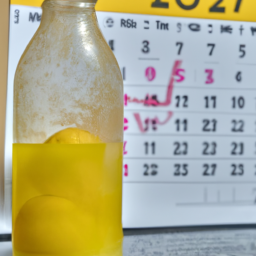
You may be curious if bottled lemon juice is as good as freshly squeezed juice, right? Well, you’re on the right track. It’s not exactly the same. Despite that, many of us choose the convenience of reaching for that bottle off the shelf. The important question is, how long can it last in your pantry or refrigerator before going bad?
Bottled lemon juice is a handy ingredient to have on hand for cooking, baking, and even cocktails. But unlike fresh lemon juice, which can last up to a week in the fridge, bottled lemon juice has a much longer shelf life. However, it’s important to know just how long it’s good for and how to properly store it to ensure it stays fresh and safe to use.
In this article, we’ll explore the shelf life of bottled lemon juice, how to store it, and some tips for using it in your cooking.
Key Takeaways
- Bottled lemon juice has a longer shelf life than fresh lemon juice, up to 6 months if stored properly.
- Proper storage conditions include refrigeration and using glass containers.
- Freezing can extend the shelf life up to 6 months.
- Check expiration dates on the label and discard if expired to avoid bacterial growth and loss of flavor and nutrients.
The Shelf Life of Bottled Lemon Juice
You might be wondering how long your bottled lemon juice lasts, but don’t worry, it typically stays fresh for up to six months if stored properly. However, it’s important to note that the six-month shelf life is an estimate, and the exact duration can vary depending on factors such as the brand of lemon juice, the storage conditions, and the expiration date. To extend the shelf life of lemon juice, make sure to store it in the refrigerator after opening and keep it tightly sealed. If you notice any changes in color, smell, or taste, it’s probably time to discard it, even if it’s within the estimated shelf life of lemon juice. Remember, proper storage is key to maintaining its freshness and flavor for as long as possible.
If you’re unsure whether your bottled lemon juice is still good, check the expiration date on the label. If the date has passed, it’s best to discard the juice. But if the expiration date hasn’t arrived yet and you’re still wary about the juice’s freshness, you can do a simple sensory test. Smell the lemon juice and if it has an off odor or taste, it’s time to get rid of it. However, don’t just throw it away there are plenty of uses for expired lemon juice, such as cleaning and cooking.
Now that we’ve covered how long bottled lemon juice typically lasts, let’s talk about how to store it to ensure its longevity.
How to Store Bottled Lemon Juice
When it comes to storing bottled lemon juice, there are a few key factors to consider. First and foremost, refrigeration is essential to maintaining freshness and preventing spoilage.
Additionally, freezing can be a viable option for extending the shelf life of lemon juice. Finally, selecting the proper container can help to preserve the flavor and quality of the juice over time.
Refrigeration
If you’re storing bottled lemon juice, it’s best to keep it refrigerated to maintain its freshness for as long as possible. While bottled lemon juice typically has preservatives to extend its shelf life, refrigeration can still prolong its quality. This is especially important if you want to enjoy the benefits of using fresh lemons, such as their high vitamin C content and natural flavor. Using bottled lemon juice may have its disadvantages, such as a less vibrant taste and potential exposure to chemicals from the plastic container, but refrigeration can help mitigate some of these issues.
To give you a better idea of how long bottled lemon juice can last in the fridge, here’s a table outlining its approximate shelf life:
| Type of Lemon Juice | Opened | Unopened |
|---|---|---|
| Concentrate | 6 months | 12 months |
| Ready-to-use | 6 months | 12 months |
It’s important to note that these timeframes are only estimates and may vary depending on the brand and storage conditions. To ensure the best quality, always check the expiration date on the bottle and follow proper storage guidelines. Now, let’s move on to the next section and discuss how freezing bottled lemon juice can impact its shelf life.
Freezing
Freezing bottled lemon juice can affect its quality and taste, so it’s important to consider the pros and cons before deciding to freeze it. When using frozen lemon juice for cooking, it’s important to note that the flavor may not be as fresh as using fresh lemon juice.
However, freezing lemon juice can be a great way to extend the shelf life of the juice, especially if you don’t use it frequently. One of the benefits of freezing lemon juice is that it can be stored for up to 6 months in the freezer. This means that you can always have lemon juice on hand for recipes that call for it, without worrying about it going bad.
Just be sure to store it in an airtight container to prevent freezer burn. Using frozen lemon juice can also be a time saver, as you won’t need to worry about squeezing fresh lemons every time you need lemon juice. When it comes to proper container selection for frozen lemon juice, it’s important to choose a container that is freezer safe and airtight.
This will prevent any air from getting in and causing freezer burn, which can affect the taste of the juice. Additionally, using a container that is the appropriate size for the amount of lemon juice being frozen can minimize the amount of air in the container. With these considerations in mind, freezing bottled lemon juice can be a great way to extend its shelf life and have it on hand for all your cooking needs.
Proper Container Selection
To ensure your frozen lemon juice stays fresh, you’ll want to select a suitable container that seals tightly, preventing any air from spoiling the taste over time. When it comes to choosing the right container, glass bottles are the best option as they do not interact with the acidic content of lemon juice, preserving its flavor and quality for an extended period. While plastic containers are a convenient and lightweight option, they may not be suitable for storing lemon juice for an extended period. Plastic containers may not be tolerant to the high acidity content in the lemon juice, which could lead to the leaching of chemicals into the lemon juice, altering its taste and quality.
To emphasize the benefits of using glass containers for storing lemon juice, here is a table comparing the pros and cons of glass and plastic containers.
| Container Type | Benefits | Drawbacks |
|---|---|---|
| Glass | Preserves flavor and quality, does not interact with acidic content | Heavy, may break easily |
| Plastic | Convenient, lightweight | May leach chemicals into acidic content, not suitable for long-term storage |
When it comes to storing lemon juice, choosing the right container can make a significant difference in preserving its quality and taste. Now that you know how to select the right container for storing your lemon juice, let’s move on to some tips for using bottled lemon juice.
Tips for Using Bottled Lemon Juice
When you’re using bottled lemon juice, there are a few tips that can help you get the most out of this ingredient. One of the benefits of using bottled lemon juice is that it’s much more convenient than fresh lemons. You don’t have to worry about squeezing or juicing the lemons, which can be time-consuming and messy.
Additionally, bottled lemon juice has a longer shelf life than fresh lemons, so you don’t have to worry about it going bad quickly. When choosing the best brand of bottled lemon juice, look for options that are made from 100% lemon juice with no added sugars or preservatives. Some brands may also have a stronger or more concentrated flavor, so consider your personal preferences when making your selection.
Now that you know how to use bottled lemon juice, let’s explore some alternatives to this ingredient.
Alternatives to Bottled Lemon Juice
If you’re tired of settling for bland and lackluster flavors, there are plenty of zesty alternatives to the typical bottled lemon juice.
One of the best lemon juice substitutes is fresh lemon juice. Not only does it have a brighter, more vibrant flavor than bottled juice, but it also has a host of health benefits. Fresh lemon juice is high in vitamin C, antioxidants, and can even aid in digestion.
Another alternative to bottled lemon juice is using other citrus juices, such as lime or grapefruit. These juices can add a unique flavor to dishes and provide similar health benefits as lemon juice. Additionally, using vinegar or white wine in place of lemon juice can provide a tangy flavor without the risk of the juice going bad.
With these lemon juice substitutes, there’s no need to settle for bland flavors in your cooking.
When it comes to recipes that use bottled lemon juice, there are plenty of options available. From salad dressings to marinades to baked goods, bottled lemon juice can add a zesty kick to any dish.
However, if you’re looking to elevate your cooking game and add some fresh, vibrant flavors to your dishes, trying out some of the alternatives mentioned above can take your meals to the next level.
Recipes that Use Bottled Lemon Juice
So, let’s talk about some recipes that use bottled lemon juice.
Salad dressings, marinades, and desserts are just a few examples of dishes that can benefit from the addition of this versatile ingredient.
But what about storing and using bottled lemon juice? Can you freeze it? And what happens if you use expired juice?
Let’s explore these questions and more in this subtopic.
Salad Dressings
To make your salad dressings last longer, you should consider using bottled lemon juice instead of fresh lemons. Not only does bottled lemon juice have a longer shelf life, but it also has consistent acidity levels that can help keep your dressings from spoiling too quickly.
Here are three reasons why bottled lemon juice is a great choice for salad dressings:
-
Creative uses: Bottled lemon juice isn’t just for salad dressings. You can also use it to make marinades, sauces, and even cocktails. Its versatility makes it a great addition to any kitchen.
-
Health benefits: Lemon juice is packed with vitamin C and antioxidants, which can help boost your immune system and promote healthy skin. It’s also a natural detoxifier that can help cleanse your body of harmful toxins.
-
Consistent flavor: One of the biggest advantages of using bottled lemon juice is the consistent flavor it provides. Fresh lemons can vary in acidity and sweetness, which can affect the overall taste of your dressing. Bottled lemon juice, on the other hand, provides a reliable and consistent flavor profile.
Transitioning into the next section about marinades, it’s important to note that bottled lemon juice can also be a great choice for marinades. By using bottled juice, you can ensure that your marinade has a consistent acidity level that can help tenderize meat and infuse it with flavor.
Marinades
Using marinades can add depth and flavor to your meats. And while some may worry about the added calories, incorporating healthier ingredients like herbs and spices can make for a nutritious and delicious meal. Marinades are mixtures of oil, acid, and flavorings that are used to tenderize and flavor meats.
The acid in the marinade breaks down the proteins in the meat, making it more tender, while the oil and flavorings infuse it with delicious flavors. Marinade recipes can vary greatly, depending on the type of meat and the desired flavor profile. Some popular ingredients for marinades include citrus juices, vinegar, soy sauce, garlic, and herbs like rosemary and thyme.
Marinating times can also vary, with tougher cuts of meat requiring longer marinating times. The benefits of marinating are many, from enhancing flavor to improving texture, and it’s a great way to add variety to your meals.
Speaking of variety, let’s move onto the next topic: desserts.
Desserts
Indulging in a sweet treat after a meal can be a satisfying way to end the day, and with endless possibilities for desserts, there’s always something new to try. If you’re a fan of tangy and refreshing flavors, then lemon flavored desserts might just be your new favorite. One of my go-to recipes is lemon curd, which can be used as a filling for cakes, tarts, and even spread on toast for a quick snack.
To make lemon curd, you’ll need fresh lemon juice, but if you’re short on time, bottled lemon juice can be a convenient substitute. However, it’s important to check the expiration date and storage recommendations on the bottle to ensure the quality and safety of the juice. According to most manufacturers, bottled lemon juice can last up to 18 months if stored properly in the refrigerator after opening. Here’s a table summarizing the shelf life of bottled lemon juice:
| STORAGE CONDITION | SHELF LIFE |
|---|---|
| Unopened bottle | Up to 2 years |
| Opened bottle in pantry | Up to 1 year |
| Opened bottle in fridge | Up to 6 months |
If you’re looking for more lemon curd recipes or other lemon flavored desserts, there are plenty of options available online or in cookbooks. Just make sure to use fresh, high-quality ingredients for the best results. Now, let’s move on to the next topic: can you freeze bottled lemon juice?
Can You Freeze Bottled Lemon Juice?
Freezing lemon juice in a small plastic bag is a great way to preserve its citrusy flavor. However, there are some precautions that you need to take to ensure that the juice stays fresh.
Before freezing the lemon juice, make sure that it’s in an airtight container and that there’s enough room for the juice to expand as it freezes. You can also add a little bit of sugar or salt to help preserve the flavor.
When it comes to thawing the lemon juice, there are a few methods that you can use. One option is to place the frozen bag in the fridge overnight. This’ll allow the juice to thaw slowly and prevent it from losing its flavor. Another option is to place the bag in a bowl of warm water for a few minutes. Just be sure not to use hot water, as this can cause the bag to burst.
By taking these precautions and using the proper thawing methods, you can enjoy the fresh taste of lemon juice in your recipes for up to six months.
As for using expired bottled lemon juice, there are some risks involved. While the juice may still be safe to consume, it may have lost some of its flavor and nutrients over time. In addition, there’s a risk of bacterial growth, which can cause foodborne illness.
If you’re unsure about the safety of your expired lemon juice, it’s best to err on the side of caution and discard it.
Can You Use Expired Bottled Lemon Juice?
Expired bottled lemon juice may not be suitable for consumption due to potential loss of flavor and nutrients and the risk of bacterial growth. Using expired lemon juice can also lead to health risks such as stomach upset, food poisoning, and other related illnesses.
Here are some important things to consider before using expired bottled lemon juice:
- Check the expiration date on the bottle before using it.
- If the bottle has been opened for a long time, it may have gone bad even if it hasn’t expired yet.
- If the juice has a strange smell or taste, it’s best to discard it.
- Using expired lemon juice in recipes can affect the taste of the dish.
It’s always better to use fresh lemon juice for optimal flavor and nutritional value. It’s important to note that bottled lemon juice, whether expired or not, may not be as good as fresh lemon juice. The freshness of the juice can impact the taste and nutritional value of the juice.
In the next section, we’ll discuss whether bottled lemon juice is as good as fresh.
Is Bottled Lemon Juice as Good as Fresh?
Savoring the tangy zing of freshly squeezed lemon juice elevates the taste and quality of dishes compared to its store-bought counterpart. However, using bottled lemon juice also has its benefits.
Bottled lemon juice is convenient and can last for a longer time compared to fresh lemons. It’s also consistent in terms of acidity level, ensuring that your dishes have the right balance of flavors.
When comparing bottled lemon juice with other bottled citrus juices, bottled lemon juice stands out in terms of versatility. It can be used in a wide range of dishes, from savory to sweet. Its flavor also blends well with other ingredients, making it a staple in many kitchens.
Overall, while fresh lemon juice may be ideal in certain situations, bottled lemon juice is a reliable and convenient alternative that can elevate the taste of your dishes.
Frequently Asked Questions
Can I use bottled lemon juice for baking?
As the adage goes, "when life gives you bottled lemon juice, use it for baking."Baking with bottled lemon juice is possible, but be aware of flavor differences compared to fresh lemon juice.
Is bottled lemon juice pasteurized?
Yes, bottled lemon juice is usually pasteurized, providing benefits such as increased shelf stability and reduced risk of bacterial contamination. This process involves heating the juice to kill harmful microorganisms without affecting its flavor or nutritional value.
How long does freshly squeezed lemon juice last compared to bottled lemon juice?
Did you know that freshly squeezed lemon juice contains up to 5 times more Vitamin C than bottled lemon juice? In terms of flavor differences, fresh lemon juice has a brighter, more vibrant taste compared to the slightly dull taste of bottled lemon juice.
Are there any health benefits to using bottled lemon juice?
I have found that bottled lemon juice may not provide the same health benefits as freshly squeezed lemon juice. However, it can still be used in lemon juice cleansing and weight loss regimens.
Can I freeze bottled lemon juice to extend its shelf life?
Yes, you can freeze bottled lemon juice to extend its shelf life. Freezing prevents bacteria growth and oxidation, maintaining the juice’s quality for up to 6 months. Thaw in the fridge before using.
Conclusion
In conclusion, bottled lemon juice is a convenient and versatile ingredient that can be used in a variety of recipes. However, it’s important to keep in mind that the shelf life of bottled lemon juice varies depending on the brand and storage method. On average, bottled lemon juice can last up to six months in the refrigerator.
Interestingly, a study conducted by the United States Department of Agriculture found that bottled lemon juice can contain more vitamin C than fresh lemon juice. This is because bottled lemon juice is often made from the juice of high-quality lemons that are harvested at their peak, while fresh lemons may have varying levels of vitamin C depending on the ripeness and quality of the fruit.
So, when it comes to getting your daily dose of vitamin C, bottled lemon juice may be a more reliable source than fresh lemons. Remember to always check the expiration date and storage instructions on your bottled lemon juice to ensure its freshness and quality.
Cindy thoroughly researches juicing trends, techniques, and recipes to provide readers with practical advice and inspiration. Her writing style is accessible, engaging, and designed to make complex concepts easy to understand. Cindy’s dedication to promoting the advantages of juicing shines through her work, empowering readers to make positive changes in their lives through the simple act of juicing.
-

 Popular Juice Brands3 weeks ago
Popular Juice Brands3 weeks ago10 Top-Rated Organic Juice Brands to Try
-

 Popular Juice Brands4 weeks ago
Popular Juice Brands4 weeks ago9 Best No-Sugar-Added Popular Juice Brands
-

 Health Benefits of Juice1 week ago
Health Benefits of Juice1 week agoHow Much Bottled Lemon Juice Equals 1 Lemon
-

 Vegetable Juices3 weeks ago
Vegetable Juices3 weeks ago12 Top Organic Vegetable Juice Brands Reviewed
-

 Juice Tips and Tricks5 days ago
Juice Tips and Tricks5 days agoHow Long Does Lemon Juice Last After Expiration Date
-
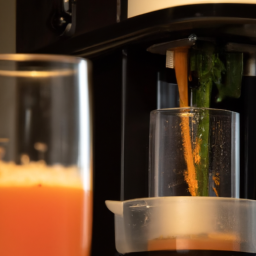
 Juice Tips and Tricks1 week ago
Juice Tips and Tricks1 week agoHow Long Does Juice Last After Juicing
-

 Juice Tips and Tricks7 days ago
Juice Tips and Tricks7 days ago2 Lemons Equal How Much Juice
-

 Vetted3 months ago
Vetted3 months ago15 Best Juices for Diabetics: Refreshing Options That Won’t Spike Your Blood Sugar




